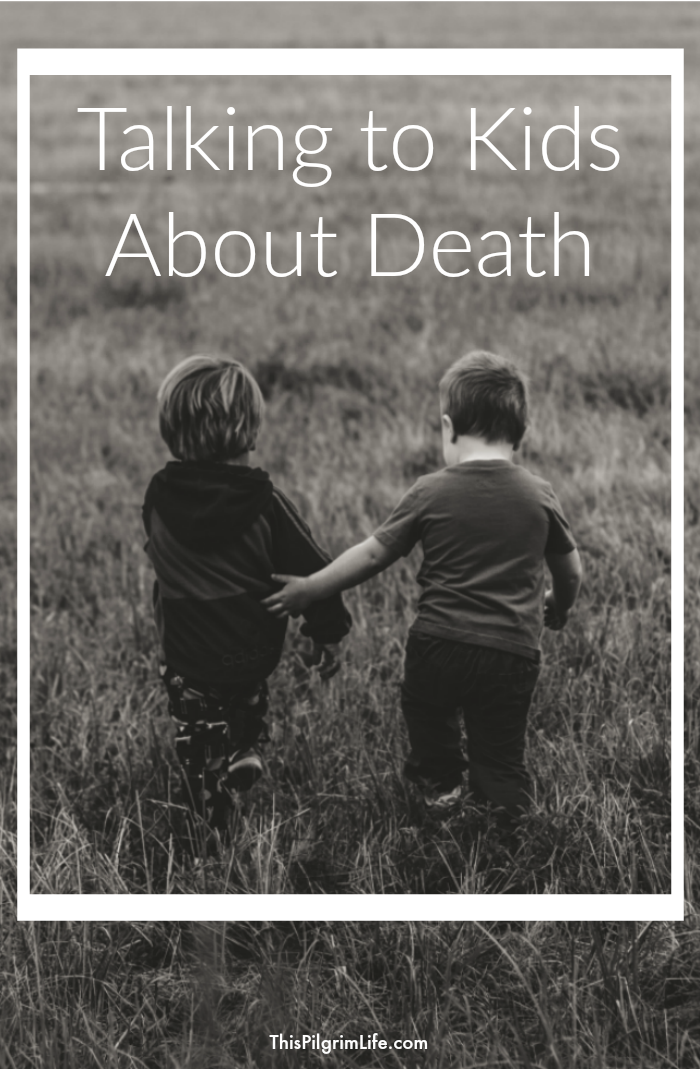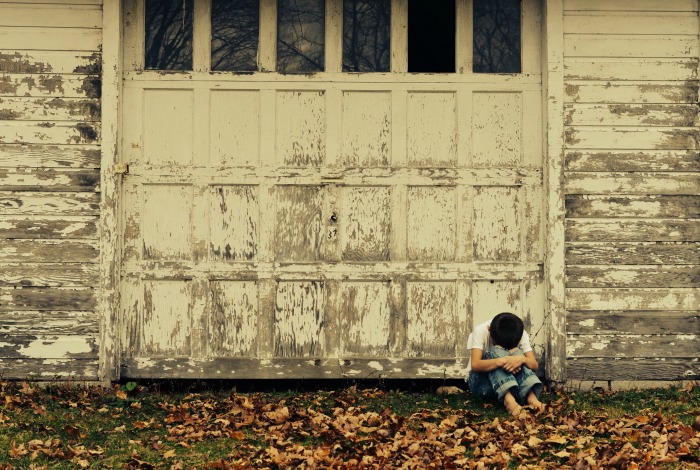Talking to kids about death isn’t something that ANY of us really want to do, but knowing what to say ahead of time can help.

Death is never really something we want to talk about, especially with our kids. It’s messy and devastating to lose loved ones. In some ways, it is easier to change the subject, to skirt around the issue, or to placate our kids with various distractions.
The thing is, though, death happens in unexpected and unwanted ways. We cannot account for how or when our children will be affected. Family members die of cancer. Children lose their life in car accidents. We lose beloved friends and tiny babies. As much as it grieves our hearts, we can’t bury our heads in the sand.
Recently, the idea of talking to kids about death has been on my mind a great deal because I have been walking along close friends who have had to say goodbye to loved ones much too soon. Their young children are saying things and asking questions that are heartbreaking to hear, and we have talked about how to explain such a difficult topic to little ears.
It wasn’t too long ago that my husband and I had to come home from the hospital and tell our children that their much anticipated, much loved, baby brother had died without warning. I remember thinking then both how sad it was to be walking them through grief at such a young age, and how thankful I was that we had begun to teach them about God and death before they were thrown into mourning their brother’s death.
Talking to Kids About Death
How do you talk to kids about death before you lose a loved one? While you are in the midst of the pain? And after the grief begins to subside? Each season calls for a different approach and a close attention to our children’s individual needs.

Before
As with so many things in parenting and life in general, intentionally laying a foundation of understanding and trust before tragedy occurs is so very helpful.
In our home, we have relied on children’s literature, discussing hymns, and everyday conversations to slowly and naturally teach our children about death.
There is no script or formula for what you should say, but as you talk to your kids about death, keep these three important things in mind:
1. Use real terms.
Using substitute terms for death can be tempting because we think we are softening the reality for our children. But telling our kids that their loved one is just “sleeping” or “resting” or even that they have “passed away” can be confusing to a child. Especially when everyone is using different terms, but still intending the same meaning. Along the same lines, telling children (or adults) that a loved one who has died is now an angel watching over them, is well-meaning but not true.
Often, the most direct and simplest answer is the best answer. Be straightforward with your children and use the proper terms.
Of course, our children do not need to be included in every detail, and there are ways we can and should shield them from the many harsh realities of death. Discuss what you feel comfortable discussing and remember that you can always share more details at a later point when your children are more mature.
2. Give them a biblical framework for death.
Theology and doctrine help us to make sense of the world. Even when we do not understand God’s purposes in all that He does, knowing His character, His vast plan of redemption, and His unfailing love for His children, we are better able to withstand the darkest times of grief and struggle.
We should not deny this knowledge to our children simply because we wonder if they are too young to understand. We can give our children the gift of teaching them to wonder and trust in a great God. Withholding doctrine, however simply taught, from children is leaving them without an anchor in a storm.
This is what we teach our children about death, in a nutshell:
- Our understanding of death begins in the garden of Eden. When sin entered the world, so did death. Every person born after Adam was born in sin and will die one day. (Genesis 3, Romans 5:12)
- God put a plan in action to save people from their sins and from the curse of death in the very beginning, in the garden. Jesus crushed the power of sin and death when He died on the cross and rose from the dead. (Genesis 3, 1 Corinthians 15:54-57)
- Everyone who trusts in Jesus and turns from their sin can be free from death and enjoy eternal life with God. (Romans 10:9, Hebrews 2:15)
- Death is still sad. We grieve when people die because we know that is not how things were meant to be. But we do not grieve without hope. (see next point).
3. Emphasize the bond of death and hope for the believer.
Death is overwhelming for all of us, children and adults. Losing someone we love is heart-wrenching and painful. We have questions that may never be answered, and though our grief may wane in time, we will always remember and miss those we love.
The pain is real, but “we do not grieve as those who have no hope”. Our comfort and refuge in our grieving is our faith in a God who is both sovereign and good, who is “bringing many sons to glory”. (1 Thess 4:13, Hebrews 2:10)
Our children need to know that death is not the end, is not to be feared, and that God’s love and mercy will see us all through.

During
If the time before a crisis is when we lay a foundation, the time during a crisis is when we simply share our tears and open our hearts to one another.
One of the most important things we can do when our children are grieving, is to let them know that their whole range of emotions is valid. Children should not be made to feel ashamed of crying at inopportune times, they need to know it is okay to feel angry and overwhelmed, and they may need to be reminded that it is still okay to be happy and excited about things.
Most of all, children need to know that they can take all their varied emotions to God. Let them know that God is not surprised or disappointed by their feelings, there is nothing to hide. Read the Psalms together and show your children that they are far from the first to be sad, upset, or doubting.
I also find hymns to be wonderful tutors for processing grief in light of God’s truth. Sitting down and going through a hymn verse by verse is not necessary. Play them as you go about your day or drive in the car, and you will find them ministering to your own heart and opening up conversations with your children.
It is also important to let your children see you grieving. Children learn from watching their parents. If we always seclude ourselves to grieve in private, then they are missing out on a chance to learn how to handle their own sadness in healthy ways.
Be honest with your children about how your heart is hurting. Share with them when you are missing your loved one. Bringing them into your grieving a little further shows them what they are going through is normal.
After
There is no timetable for grief– when it should start and stop. Colors, smells, songs, and so much more can trigger a memory and bring feelings of sorrow rushing back.
Help your children understand the grieving process. Explain to them that people grieve in different ways. Especially if you have multiple children in your home, there may be a (hidden) tendency to compare how each other is grieving. One child who is less demonstrative may worry that others will think they are not sad or missing their loved one.
Talk with your children about how they are each processing their grief and find ways to support them in it. Do they need more time alone? Do they need special one-on-one time with a parent to feel secure? Maybe a special journal to record thoughts and drawings would help them walk through their grief in their own way.
We all know, too, that stress of any kind tends to more readily bring our sinfulness to the surface. You may notice your children fighting more, neglecting responsibilities, arguing with you, and so on. This is only natural.
Show your children grace. Remember that you as an adult have much more experience discerning your feelings and handling stress in positive ways. Likely, your children do not enjoy the increase in fighting, etc, any more than you do. But feelings are big and can be overwhelming. Take a step back, look on them with compassion, and together work on addressing the heart of the issue.

Of course, I hope that your family would not be affected by death. But, until Christ comes back, death is a part of this world. The best thing that we can do is to teach our children everyday that God is GOOD, that He is in control over ALL things, and that there is NOTHING that could ever happen that could separate us from His love, nothing that we can feel or do that we could not bring to Him.
Resources we love:
Dangerous Journey :: This is a picture book version of Pilgrim’s Progress. It is beautifully written and illustrated, and has afforded us many opportunities to discuss the Christian life, death, and heaven.
The Biggest Story :: This book is excellent for teaching children God’s grand, over-arching plan of redemption that is woven through all of the Bible.
Indelible Grace : The Hymn Sing :: This album by one of our favorite music groups includes some of our favorite hymns, as well as several introductions full of encouragement and teaching.
Such a great article! As a mom, I feel like I failed my kids in this area … mostly because I didn’t know how to handle death myself.
Now that I’m a grandma, I am keeping this in my arsenal to read again when the need arises.
Thank you for sharing it. ❤️
Do you have any thoughts for addressing death of a pet? We recently had a few of ours die of old age (lots of animals on the farm). I told my daughter that they died, but being under 2 at the time, she had no concept of death, and still does not. That leads me to ask, how do you address the concept of death for very young ones who are attentive to the world around them (she noticed they were gone), but may not understand concepts such as death? Sorry for such a long question, just looking for some thoughts / suggestions.